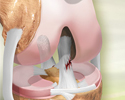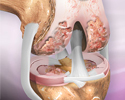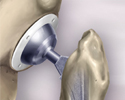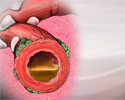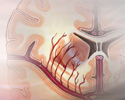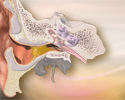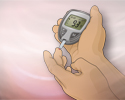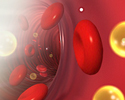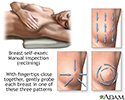Multimedia Gallery
Hyperthyroidism
You're restless and nervous. You feel hungry all the time, but no matter how much you eat, you keep losing weight. You can't sleep or concentrate, and you feel hot and sweaty. If symptoms like these are putting you on edge, the problem may be an overactive thyroid gland, or hyperthyroidism.
This little butterfly-shaped structure in your neck is your thyroid gland. It's job is to release the hormones that help control your body's energy levels, a process known as metabolism. When you have hyperthyroidism, that little gland goes into overdrive, releasing too much of its hormones. Having too much thyroid hormone is like putting your body in fast forward, everything speeds up. That's why you feel shaky, hungry, and your heart feels like it's pounding.
So, what causes hyperthyroidism?
You can develop an overactive thyroid because you've gotten too much iodine, an element the thyroid uses to make its hormones. Or, you might have a growth on your thyroid that's causing the excess hormone production. But many people with hyperthyroidism have an autoimmune disorder called Graves disease, which also makes their eyes bulge out.
During an exam, your doctor may notice that your thyroid is larger than normal, and that you have high blood pressure, tremors, or a fast heart rate. These can all be signs of hypothyroidism. You'll probably have a blood test to check the levels of your thyroid hormones.
If you do have an overactive thyroid, you may need to take medicine to slow down the gland and its hormone production. Or, your doctor may suggest having surgery to remove some or all of the thyroid, or taking radioactive iodine to destroy it. If you have surgery or radioactive iodine treatment, you'll probably need to take thyroid hormones for the rest of your life to replace the ones your body can no longer make.
You can't prevent hyperthyroidism, but once you have it, it's usually pretty easy to treat. With the right treatment you can finally be free from its symptoms.
While you're being treated, watch out for an emergency condition called thyroid crisis, or thyroid storm, which can set in if you've been under a lot of stress or have an infection. If you have a fever, fast and unsteady heartbeat, or you feel less alert than usual, call your emergency services number or go to the ER right away.
Hyperthyroidism
Review Date: 7/21/2024
Reviewed By: Sandeep K. Dhaliwal, MD, board-certified in Diabetes, Endocrinology, and Metabolism, Springfield, VA. Also reviewed by David C. Dugdale, MD, Medical Director, Brenda Conaway, Editorial Director, and the A.D.A.M. Editorial team.
© 1997- A.D.A.M., a business unit of Ebix, Inc. Any duplication or distribution of the information contained herein is strictly prohibited.
Animations
- Abdominal aortic aneurysm
- Abdominal pain
- ACL injury
- Acne
- Alcoholic liver disease
- Allergic rhinitis
- Allergies
- Allergy testing
- Allergy to mold - animal da...
- Alzheimer disease
- Alzheimer disease
- Anemia
- Ankylosing spondylitis
- Anterior shoulder stretch
- Anti-reflux surgery
- Appendectomy
- Appendicitis
- Arm reach
- Arthritis
- Asthma
- Atherosclerosis
- Atopic dermatitis
- Atrial fibrillation
- Basal cell carcinoma
- Bipolar disorder
- Bladder function - neurolog...
- Breast cancer
- Breast engorgement
- Breast lift
- Breast self-exam
- Breastfeeding
- Bronchitis
- Bronchoscopy
- Bunion
- Cardiac catheterization
- Carpal tunnel syndrome
- Cataract
- Cataracts
- Cell division
- Cervical cancer
- Cesarean section
- Chest pain
- Cholesterol and triglycerid...
- Chronic obstructive pulmona...
- Cluster headache
- Colon cancer
- Colorectal polyps
- Common cold
- Conception - general
- Conception - pregnancy
- Conception of identical twins
- Concussion
- Cosmetic surgery of the face
- Crohn disease
- C-section
- Depression
- Diabetes
- Dialysis
- Diarrhea
- Early labor
- Egg cell production
- Egg production
- Electrocardiogram
- Endometriosis
- Epilepsy
- Essential hypertension
- External rotation with band
- Fibromyalgia
- Flu
- Food poisoning
- Foot pain
- Formation of twins
- Gallstones
- Gastroesophageal reflux disease
- Getting rid of lice in the home
- Glaucoma
- Hardening of arteries
- HbA1c
- Head injury
- Healthy Guide to Fast Food
- Hearing loss
- Heart attack
- Heart failure
- Heartburn
- Heel pain
- Hepatitis A
- Hepatitis B
- Hepatitis C
- Hernia
- Herniated disk
- Hip joint replacement
- Hodgkin lymphoma
- How to remove a splinter
- How to treat a nosebleed
- How to treat a sunburn
- How to use a peak flow meter
- How to use a pill cutter
- How to use eye drops
- How to use nasal sprays
- Hypertension
- Hyperthyroidism
- Hypothyroidism
- Hysterectomy
- Insomnia
- Internal rotation with band
- Iron deficiency anemia
- Irritable bowel syndrome
- Isometric
- Kidney stones
- Kidney stones
- Knee joint replacement
- Let's talk about pink eye
- Liposuction
- Lung cancer
- Lyme disease
- Lymphatics and the breast
- Melanoma
- Menopause
- Migraine
- Multiple sclerosis
- Nasal congestion
- Neck pain
- Nuclear stress test
- Obstructive sleep apnea
- Osteoarthritis
- Osteoarthritis
- Osteoporosis
- Osteoporosis
- Ovulation
- Pap smear
- Pendulum exercise
- Peptic ulcer
- Pharyngitis
- Placenta delivery
- Placenta formation
- Plantar fasciitis
- Pneumonia
- Preeclampsia
- Pregnancy
- Pregnancy care
- Psoriasis
- Rheumatoid arthritis
- Rotator cuff problems
- Rupturing membranes
- Sciatica
- Seizures
- Shingles
- Shoulder blade retraction
- Shoulder blade retraction w...
- Shoulder pain
- Sinusitis
- Sleep disorders
- Smoking tips to quit
- Snoring
- Spinal stenosis
- Stent
- Storing breast milk
- Strep throat
- Stretching back of your shoulder
- Stroke
- Systemic lupus erythematosus
- Tension headache
- The difference between a co...
- The role of amniotic fluid
- Tips on buying cold and flu...
- Tips on removing ear wax
- Tracking your blood pressur...
- Treating eyelid bumps
- Twin-to-twin transfusion sy...
- Type 2 diabetes
- Ulcerative colitis
- Ultrasound
- Understanding cholesterol r...
- Up the back stretch
- Urinary incontinence
- Urinary tract infection - adults
- Uterine fibroids
- Vacation health care
- Vaginal delivery
- Varicose veins
- Venous insufficiency
- Wall push-up
- Wall stretch
- Warts
- What are hives?
- What causes wheezing?
- What in the world is a neti pot?
- What is tennis elbow?
- What makes your heart beat?
- What to do when something g...
Illustrations
- 3D ultrasound
- Abnormal discharge from the...
- Abnormal menstrual periods
- Absence of menstruation (am...
- Amniocentesis
- Amniotic fluid
- Anatomy of a normal placenta
- Anterior vaginal wall repair
- Bleeding between periods
- Breast infection
- Breast lumps
- Breast pain
- Breast self-exam
- Breast self-exam
- Breast self-exam
- Breastfeeding
- Causes of breast lumps
- Causes of breast lumps
- Causes of painful intercourse
- Causes of sexual dysfunction
- Causes of vaginal itching
- Cervical biopsy
- Cervical cancer
- Cervical cancer
- Cervical cryosurgery
- Cervical cryosurgery
- Cervical erosion
- Cervical neoplasia
- Cervical polyps
- Cervicitis
- Cervix needle sample
- Cesarean section
- Cesarean section
- Cesarean section
- Childbirth
- Cold cone removal
- Colposcopy-directed biopsy
- Culdocentesis
- D and C
- Delivery presentations
- Depression and the menstrua...
- Developmental disorders of ...
- Early pregnancy
- Early weeks of pregnancy
- Ectopic pregnancy
- Emergency Childbirth
- Emergency Childbirth
- Endometrial biopsy
- Endometrial biopsy
- Endometrial cancer
- Endometriosis
- Endometritis
- Episiotomy aftercare
- Excision of breast lump
- Female breast
- Female perineal anatomy
- Female reproductive anatomy
- Female reproductive anatomy
- Female reproductive anatomy...
- Female urinary tract
- Female-pattern baldness
- Fibrocystic breast change
- Fibroid tumors
- First trimester of pregnancy
- Folic acid
- Genetic counseling and pren...
- Gestational ages
- Gestational diabetes
- Hysterectomy
- Inflatable artificial sphincter
- Intraductal papilloma
- Lumpectomy
- Mammary gland
- Mammography
- Mammoplasty
- Menopause
- Morning sickness
- Nabothian cyst
- Necrobiosis lipoidica diabe...
- Necrobiosis lipoidica diabe...
- Needle biopsy of the breast
- Normal female anatomy
- Normal female breast anatomy
- Normal uterine anatomy (cut...
- Open biopsy of the breast
- Oral glucose tolerance test
- Ovarian cancer
- Ovarian cancer dangers
- Ovarian cancer metastasis
- Ovarian cyst
- Ovarian cysts
- Ovarian growth worries
- Pap smear
- Pap smear
- Pap smears and cervical cancer
- Pelvic adhesions
- Pelvic laparoscopy
- Peritoneal and ovarian canc...
- Placenta
- Placenta
- Placenta
- Placenta previa
- Preeclampsia
- Pregnancy test
- Premenstrual bloating
- Prevention of cystitis
- Primary amenorrhea
- Relief of menstrual cramps
- Relieving PMS
- Rotator cuff muscles
- Secondary amenorrhea
- Side sectional view of fema...
- Stein-Leventhal syndrome
- Stress incontinence
- Stress incontinence
- Teratoma - MRI scan
- The wet mount vaginitis test
- Threatened miscarriage
- Transvaginal ultrasound
- Ultrasound comparison
- Ultrasound in pregnancy
- Ureteral biopsy
- Uterine anatomy
- Uterus
- Vaginal bleeding during pre...
- Vaginal discharge
- Yeast infections
Presentations
- Achalasia - series
- Adenoid removal - series
- Animal bite - first aid - series
- Ankle sprain - Series
- Appendectomy - series
- Bone fracture repair - series
- Bone-marrow transplant - series
- Bruise healing - series
- Cataract surgery - series
- Chest tube insertion - series
- Choking first aid - adult o...
- Choking first aid - infant ...
- Circumcision - series
- Cleft lip repair - series
- Clubfoot repair - series
- Colon cancer - series
- Complete blood count - series
- Convulsions - first aid - series
- CPR - child 1 to 8 years ol...
- CPR - infant - series
- Craniotomy - series
- Diaphragmatic hernia repair...
- Ear tube insertion - series
- Eardrum repair - series
- Emergency airway puncture ...
- Exchange transfusion - series
- Gastroesophageal reflux - series
- Gastroschisis repair - series
- Heart valve surgery - series
- Hemangioma excision - series
- Hiatal hernia repair - series
- Hydrocele repair - series
- Hypospadias repair - series
- Imperforate anus repair - ...
- Infantile pyloric stenosis ...
- Inflammatory bowel disease ...
- Inguinal hernia repair - series
- Intestinal obstruction (ped...
- Intestinal obstruction repa...
- Large bowel resection - series
- Leg lengthening - series
- Mastoidectomy - series
- Meckel's diverticulectomy ...
- Meningocele repair - series
- Metered dose inhaler use - ...
- Minor burn - first aid - series
- Minor cut - first aid
- Monitoring blood glucose - ...
- Nebulizer use - series
- Omphalocele repair - series
- Pancreatitis - series
- Patent ductus arteriosis (P...
- Patent urachus repair - series
- Pectus excavatum repair - ...
- Pneumothorax - series
- Repair of webbed fingers -...
- Retinal detachment repair ...
- Rh incompatibility - series
- Small bowel resection - series
- Spleen removal - series
- Thyroidectomy - series
- Tonsillectomy - series
- Tracheoesophageal fistula r...
- Two person roll - series
- Umbilical hernia repair - ...
- Ventriculoperitoneal shunt ...
- White blood cell count - series

 Bookmark
Bookmark




































